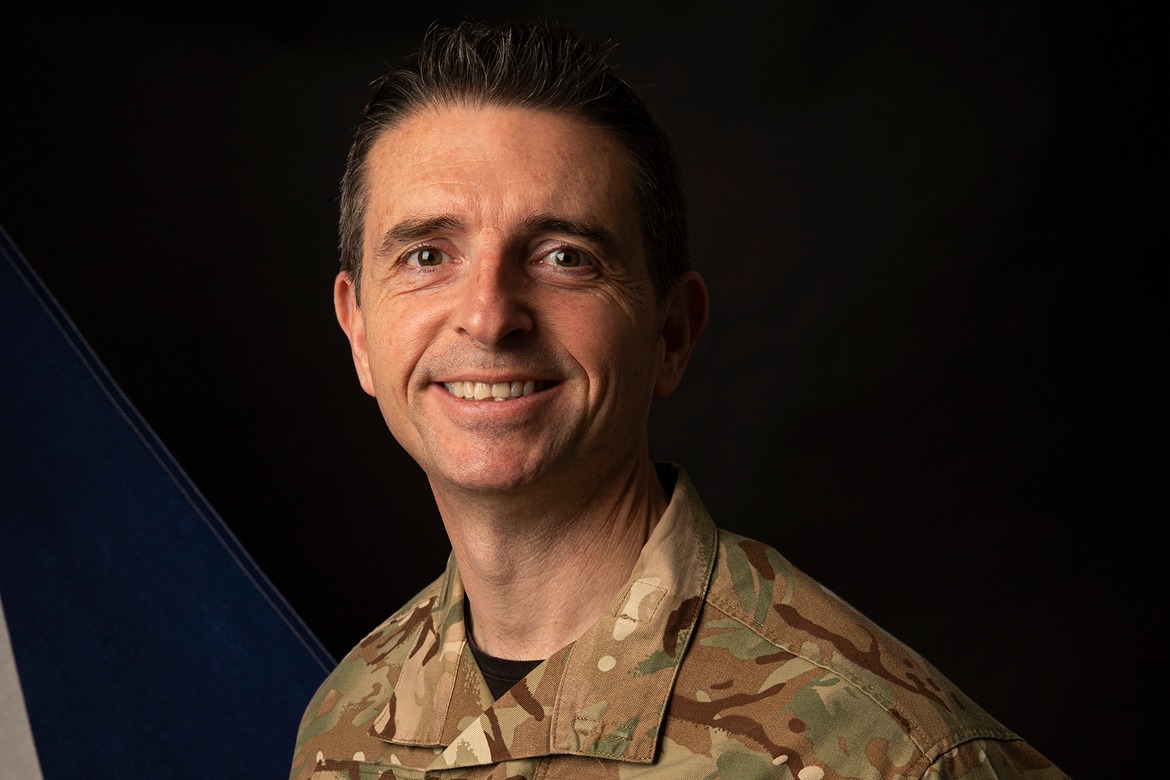AVM Paul Godfrey on 3 years of Space Command
15th Apr 2024
It’s been three years since the UK launched its own Space Command branch of the British Armed Forces, following the precedent set by the USA and France, and five years since NATO officially declared space as the fifth operational domain. One person who has been with Space Command from its very inception, UK Space Commander AVM Paul Godfrey, looked back on his time leading Space Command at SpaceComm 2024.
Government leaders made these decisions based on the sheer importance of space technologies and capabilities in managing essential systems here on Earth – such as GPS, wifi, or countless military tracking, screening and reconnaissance systems – as well as the increasing security challenges that come with such a reliance.
“I think it’s a feeling across the international community that the operationalization of the domain has kind of snuck up on us,” said AVM Paul Godfrey.
“Space has always been this peaceful domain, there were bits going on, direct ascent anti-satellite weapons is one. We’ve always kind of left it to the United States when it came to defence in space.”
However, since NATO’s declaration in 2019, allied countries have worked collaboratively to define and establish the role of Space Command within the military.
“What has stood out to me is that everyone [is] working together and everyone is going in the right direction, because we know just how important that domain is, and therefore we would never want any sort of destructive warfare going on in there,” AVM Godfrey says.
“And it’s up to us to understand what is going on in the domain and to preserve that domain, which is why we’ve ended up with our vision to make space safe, secure and sustainable for all generations.”
Space has a ‘PR problem’
AVM Paul Godfrey made his comments at SpaceComm 2024, just weeks before the UK Space Command celebrated its third anniversary.
In his opening address at the conference, he noted that while the world’s militaries have rushed to understand, address and embrace today’s space capabilities, the rest of the world perhaps remains in the dark about the impact that space technologies have on daily life.
“Three years in, audiences still do not realise how critical space is to our way of life,” he said. “In fact, space supports 18 per cent of UK GDP, that’s £70 billion every year.”
“More and more, I’m convinced space does have a PR problem,” he added.
AVM Paul Godfrey reflected on the 2018 Blackett Report, which revealed that the loss of positioning navigation and timing (PNT) signal for just one week would cost “upwards of £5 billion”.
“Imagine not being able to get money from the cash machine, nor can you use your credit card. Or [imagine] the road rage when the traffic lights are no longer synchronized,” he said, alluding to just some of the technologies on Earth that are dictated by satellite technologies in low-earth orbit.
By extension, AVM Godfrey said that perhaps it is important for civilian society to realise that its day-to-day operations are “a little more fragile” than previously thought, which again highlights the importance of protected assets in space.
The UK’s first Space Commander
UK Space Command was established on 1 April 2021, with AVM Godfrey stepping up to lead the unit through its infancy. He said the formation of Space Command was done in understanding of the importance of the space domain, especially in military operations.
“Space is the highest ground to be able to see from, it’s the enabler for our global communications”, as well as being central for remotely piloted air systems, GPS, and precision targeting.
“Space is essential for the UK and its allies as we seek to protect our people, our territories, our values and our interests,” he said.
After leading Space Command through its inaugural years, AVM Godfrey is preparing to step down from his position in May 2024, as he instead steps into the role of Director Capability at Strategic Command, formerly known as Joint Forces Command.
AVM Paul Godfrey on 3 years of UK Space Command
Speaking later at a Q&A session at SpaceCom 2024, he looked back on the achievements of UK Space Command over its first three years, first telling the audience about the “startup vibe” that Space Command has held.
“I remember on the 31st of March, 2021, there literally were six of us around the table, five of them looking at me, all wondering what was going to happen the next day.”
“What did happen is that we inherited the [early detection and space domain awareness radar base] RAF Flyingdales. We inherited the Space Operations Center, 60-odd people working down at High Wycombe, with the UK Space Agency and so on. We inherited a unit up in Waddington as well, that was looking at potential tactics that our adversaries might be using against us. But then it was up to us now to build a headquarters around that,” he said.
From those initial six staffers at the table of UK Space Command, today there are now more than 600 personnel across the command.
According to AVM Paul Godfrey, the main priorities of Space Command have always been to “provide a single unified lead within Defence”, to create and maintain UK defence space operations, develop new space capability, and lead the charge on training and education in the space domain for Defence, which was targeted in a tiered approach over the first three years in operation.
“Year One was about forming the command, and continuing space domain awareness and ongoing missions that we inherited from the Royal Air Force, bringing personnel in, creating relationships across the world, and preparing the ground to generate additional capability,” he explained.
“Year Two was about developing our processes and procedures, in order to take over existing capability programs and start to grow and develop our own.
“And Year Three, this year, is all about full operationalisation, building new capabilities, understanding the threats to our systems, and responding to those threats by further integrating with allies and partners.”
AVM Godfrey revealed that from 16 May, 2024, Brigadier Paul Tedman – formerly a Deputy Director of US Space Command and a British Army pilot since 1997 – will take over the top job at UK Space Command.
“I’ve always said right from the beginning that we were always about digging the foundations, digging out the trenches, pouring the concrete, levelling it off, and making this a solid foundation on which others can then build,” AVM Godfrey shared.
“And so hopefully I’ll leave my successor with a set of foundations that are solid, and a blueprint to build the rest of the house. But with the ability to change a couple of rooms in the house, change the colour of the furniture, and make it his own.
“[My job] was always, right from the beginning, about building up those foundations, and hopefully, we’ve done that.”







Thank you for your comment! It will be visible on the site after moderation.